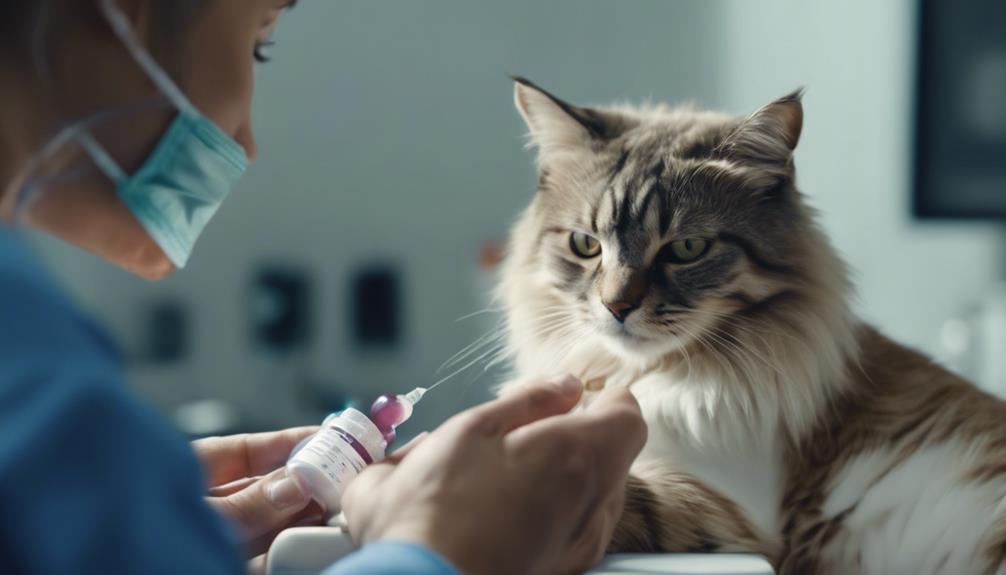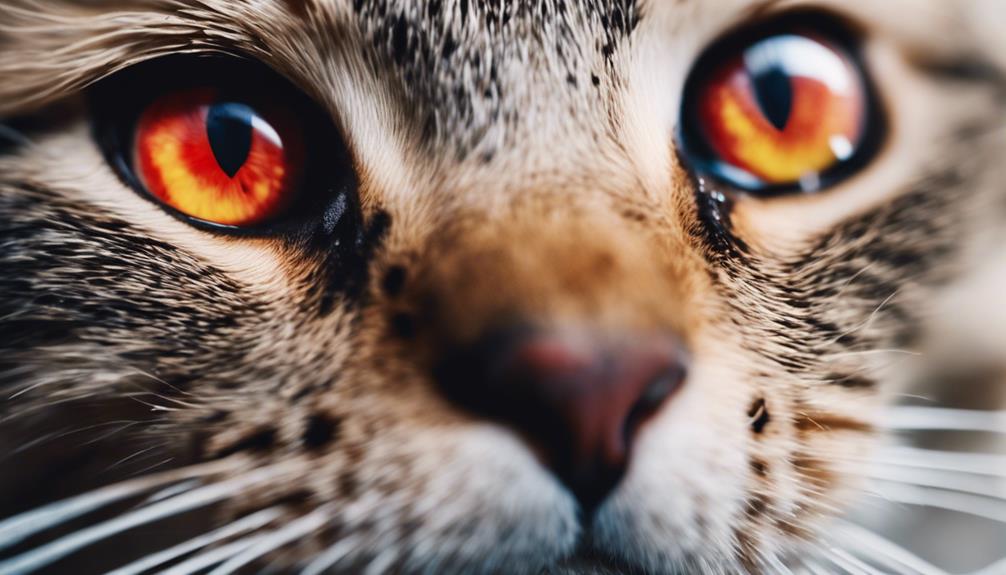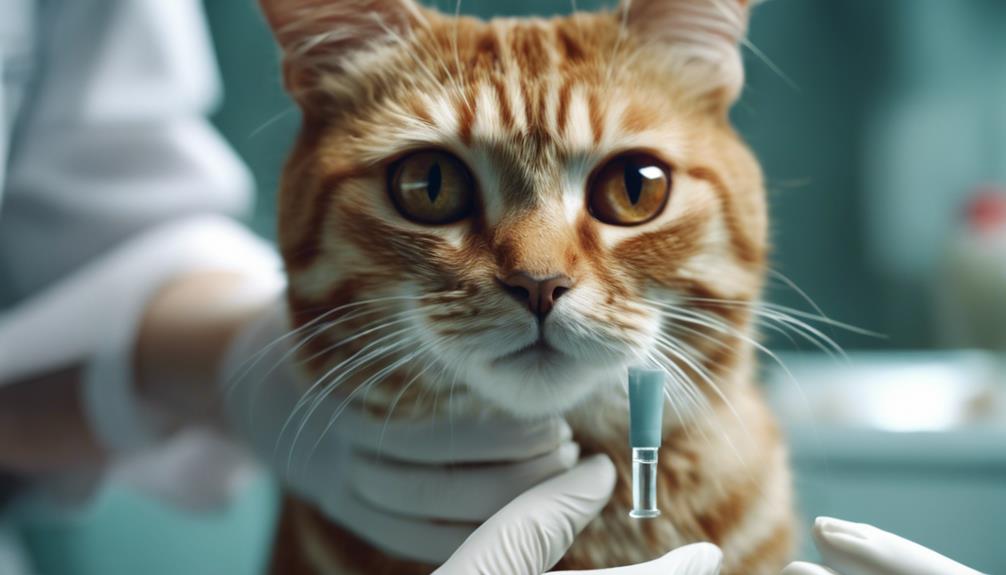Within the intricate realm of feline health, colitis emerges as a complex and prevalent concern for cat owners. Understanding the multifaceted causes, subtle signs, and diverse treatment options of this gastrointestinal condition is crucial for effective management.
From identifying early indicators to exploring tailored therapies, the journey of addressing colitis in cats unveils a spectrum of considerations. As caregivers navigate this nuanced landscape, a deeper insight into the intricacies of colitis paves the way for informed decisions and compassionate care for our feline companions.
Key Takeaways
- Colitis causes in cats: IBD, stress, parasites, food intolerance.
- Signs: bloody stool, defecating outside box, increased frequency.
- Treatments: medications, diet changes, home remedies, hospital care.
- Outlook: acute resolves with treatment, chronic needs lifelong management.
Causes of Colitis in Cats
Colitis in cats can be attributed to various underlying causes. These include inflammatory bowel disease (IBD), irritable bowel syndrome, stress and anxiety, intestinal parasites, and food intolerance or sensitivity.
Inflammatory bowel disease, a common culprit, involves chronic inflammation of the gastrointestinal tract. Cats with IBD may experience diarrhea, vomiting, weight loss, and decreased appetite. Irritable bowel syndrome, characterized by gastrointestinal distress without structural changes, can lead to colitis symptoms like diarrhea and abdominal pain.
Stress and anxiety can also trigger colitis in cats, disrupting their digestive system. Additionally, intestinal parasites and food intolerance or sensitivity can result in colitis, causing inflammation and discomfort in the colon.
Identifying and addressing these root causes are crucial steps in managing colitis in feline companions.
Signs and Symptoms of Colitis
Signs and symptoms of colitis in cats manifest as distinctive indicators of gastrointestinal distress, providing essential cues for timely intervention and management.
- Soft or runny stool with mucus or red blood: This distressing symptom can indicate inflammation or irritation in the cat's colon.
- Defecating outside the litter box: A clear sign of discomfort or urgency that requires attention.
- Increased frequency of bowel movements: Changes in bowel habits can signal underlying issues affecting the cat's digestive health.
- Straining to defecate: Difficulty in passing stool can be a painful experience for the cat and may indicate colitis.
Recognizing these signs promptly and seeking veterinary advice is crucial for ensuring the well-being of your feline companion.
Treatment Options for Colitis

How can veterinarians effectively manage and treat colitis in cats to alleviate symptoms and improve the overall health of feline patients?
Treatment options for colitis in cats typically involve a multifaceted approach. Medications such as dewormers, antibiotics, corticosteroids, and immunosuppressive drugs may be prescribed to address underlying causes and reduce inflammation.
Dietary modifications, including switching to hydrolyzed or novel protein diets, can help manage food sensitivities contributing to colitis. Home remedies like natural supplements and fiber additives can aid in regulating bowel movements.
In severe cases, hospital care with intravenous fluids and specialized medications may be necessary. Additionally, reducing stress and anxiety in cats can help prevent colitis flare-ups and support long-term management of the condition.
Outlook for Colitis
With appropriate management and consistent veterinary care, cats experiencing chronic colitis or inflammatory bowel disease (IBD) can lead relatively comfortable lives. Here are essential points to consider about the outlook for cats with colitis:
- Regular Vet Check-ups: Ensure your feline friend gets the necessary monitoring and adjustments to treatment.
- Quality of Life: Strive to maintain your cat's comfort and overall well-being.
- Dietary Considerations: Tailoring the diet can significantly impact the management of colitis.
- Emotional Support: Providing a stress-free environment and plenty of love can aid in your cat's recovery and long-term health.
Cat Conjunctivitis Causes

Cat conjunctivitis can be caused by various factors such as bacterial infections, viral infections like feline herpesvirus, allergies, foreign objects in the eye, or trauma and injury. When it comes to cat conjunctivitis causes, it's essential to understand the underlying reasons for your feline friend's eye discomfort. Here is a breakdown of the primary causes in a concise table:
| Causes | Description | Treatment |
|---|---|---|
| Bacterial Infections | Commonly leads to redness and discharge | Antibiotic eye drops |
| Viral Infections | Such as feline herpesvirus | Antiviral medications |
| Allergies | Environmental or food-related sensitivities | Anti-inflammatory drugs |
Understanding the cause will help in determining the most effective treatment for your cat's conjunctivitis.
Symptoms of Cat Conjunctivitis
When considering cat conjunctivitis causes and transitioning to the discussion of symptoms, understanding the signs indicative of this condition is crucial for timely and effective treatment.
- Redness in the eye: Witnessing the vibrant hue in your cat's eye can evoke feelings of concern and empathy.
- Swelling of the eyelids: Seeing the eyelids puffy can trigger a sense of protectiveness and the urge to provide comfort.
- Discharge from the eye: The sight of discharge may evoke worry and a desire to alleviate your cat's discomfort.
- Squinting or keeping the eye closed: Observing your cat in discomfort may stir feelings of empathy and the need to seek prompt treatment.
Understanding these symptoms can help you empathize with your cat and take the necessary steps to ensure their well-being.
Treatment of Cat Conjunctivitis

Effective treatment of conjunctivitis in cats typically involves a combination of topical medications and environmental adjustments to alleviate discomfort and promote healing. When treating cat conjunctivitis, it is essential to consult a veterinarian for a proper diagnosis and treatment plan tailored to the specific cause of the condition. Below is a table outlining commonly used treatments for cat conjunctivitis:
| Treatment | Description | Duration |
|---|---|---|
| Antibiotic eye drops/ointment | Fights bacterial infections in the eye | As prescribed |
| Antiviral medications | Combat viral causes of conjunctivitis | Varies based on severity |
| Anti-inflammatory drugs | Reduce inflammation and discomfort | Course of treatment |
| Warm compresses | Soothe the eye and aid in healing | Regular application |
Consulting a professional will ensure the best outcome for your feline friend's eye health.
Frequently Asked Questions
Can Colitis in Cats Be Contagious to Other Pets or Humans?
Colitis in cats is typically not contagious to other pets or humans. It is often caused by factors like IBD, stress, or food intolerance. However, good hygiene practices should be maintained to minimize any potential risks.
Are There Specific Breeds of Cats That Are More Prone to Developing Colitis?
Certain cat breeds, like Siamese and Himalayan, may have a higher predisposition to developing colitis due to genetic factors. However, any cat can be affected, emphasizing the importance of monitoring all feline companions for digestive health.
Can Colitis in Cats Lead to More Serious Health Issues if Left Untreated?
Untreated colitis in cats can progress to more severe conditions, including chronic inflammation, malnutrition, and secondary infections. Monitoring and prompt treatment are crucial to prevent long-term health issues and ensure the cat's well-being.
Are There Any Natural Remedies or Alternative Treatments That Can Help Manage Colitis in Cats?
Natural remedies like probiotics, prebiotics, and herbal supplements can aid in managing colitis in cats. Alternative treatments such as acupuncture and chiropractic care may also provide relief. Consult with a veterinarian for personalized guidance.
How Can a Cat Owner Differentiate Between Regular Digestive Issues and Colitis in Their Pet?
Differentiating between regular digestive issues and colitis in cats involves observing signs like persistent soft stool with mucus or blood, frequent bowel movements, and discomfort during defecation. If these symptoms persist, consulting a veterinarian for proper diagnosis and treatment is crucial.
Conclusion
In conclusion, colitis in cats presents a complex gastrointestinal condition that requires a nuanced understanding of its causes, signs, and treatment options.
By recognizing the signs early and implementing appropriate interventions such as medications, dietary adjustments, and stress reduction techniques, caregivers can effectively manage acute episodes and provide long-term care for chronic cases.
Vigilance and proactive measures are crucial in navigating the intricate health terrain of colitis in feline companions.




